形容词比较级最高级(整理版)
完整版)比较级最高级变化规则总结
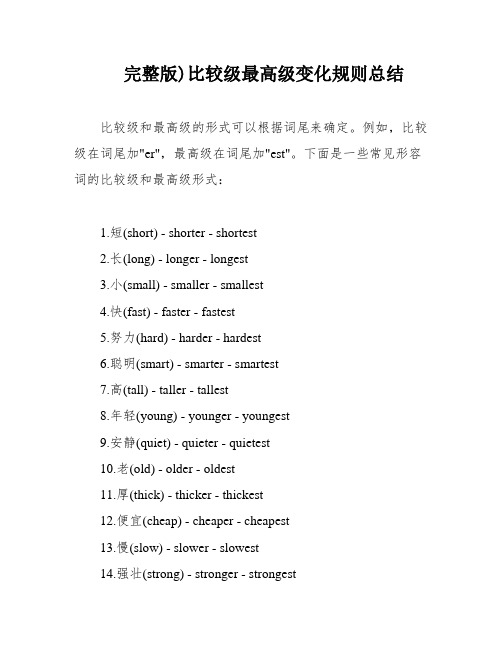
完整版)比较级最高级变化规则总结比较级和最高级的形式可以根据词尾来确定。
例如,比较级在词尾加"er",最高级在词尾加"est"。
下面是一些常见形容词的比较级和最高级形式:1.短(short) - shorter - shortest2.长(long) - longer - longest3.小(small) - smaller - smallest4.快(fast) - faster - fastest5.努力(hard) - harder - hardest6.聪明(smart) - smarter - smartest7.高(tall) - taller - tallest8.年轻(young) - younger - youngest9.安静(quiet) - quieter - quietest10.老(old) - older - oldest11.厚(thick) - thicker - thickest12.便宜(cheap) - cheaper - cheapest13.慢(slow) - slower - slowest14.强壮(strong) - stronger - strongest15.弱(weak) - weaker - weakest16.新(new) - newer - newest17.温暖(warm) - warmer - warmest18.冷(cold) - colder - coldest19.凉爽(cool) - cooler - coolest20.害羞(shy) - shyer - XXX21.紧(tight) - tighter - tightest22.干净(clean) - cleaner - cleanest23.聪明(clever) - cleverer - cleverest对于以不发音"e"结尾的单音节词,比较级直接加"r",最高级直接加"st"。
英语形容词的比较级和最高级整理

英语形容词的比较级和最高级整理常规:1、一般直接在词尾加er;est.tall---taller---the tallestgreat---greater---the greatest2、以字母e结尾的直接加r;stnice---nicer---the nicestfine---finer---the finest3、以辅音字母加y结尾的形容词变y为i再加er;estbusy---busier---the busiestheavy---heavier---the heaviest4、重读闭音节结尾的单音节词,若词尾只有一个辅音字母时,须双写这个辅音字母再加er;estbig-bigger-the biggesthot -hotter-the hottest5、少数以-y,-er,-ow,-ble结尾的双音节词,末尾加-er^D-est(以-y 结尾的词,如-y前是辅音字母,则变y为i,再加-er和-est;以-e 结尾的词仍只加-r和-st)happy—happier—happiestclever—cleverer—cleverest5、多音节和部分双音节词在词前加more、mosteasily--more easily--most easilybeautiful--more beautiful--the most beautiful特殊:(1 )有些单音节词的比较等级常用more和most,如glad,fond,shy,sly(但like 只可用more 和most)。
Eg:I am not more glad than you.我可没像你那样高兴。
Uncle Jack was more like a book of reference to my father.杰克大叔对我父亲来说真是一部参考书。
(2)有些单音节词用-er和-est或more和most皆可,如free,clear 等。
Eg:I'm clearer/more clear about it than before.对这事,我比以前更清楚了。
期末英语必考!形容词的比较级和最高级知识点汇总

期末英语必考!形容词的比较级和最高级知识点汇总变化规则大多数形容词和副词有比较级和最高级的变化,即原级、比较级和最高级,用来表示事物的等级差别。
原级即形容词的原形,比较级和最高级有规则变化和不规则变化两种。
(1)单音节词加词尾-er,-est来构成比较级和最高级。
tall(高的) taller tallestgreat(巨大的) greater greatest(2)以不发音的e结尾的单音节词只加-r,-stnice(好的) nicer nicestlarge(大的) larger largestable(有能力的) abler ablest(3)以一个辅音字母结尾的闭音节单音节词,双写结尾的辅音字母,再加-er,-estbig(大的) bigger biggesthot热的) hotter hottestred红色的 redder reddest(4)'以辅音字母+y'结尾的双音节词,改y为i,再加-er,-esteasy(容易的) easier easiestbusy(忙的) busier busiest(5)以ly结尾的副词,除early-earlier-earliest,其他都是加more most.Slowly-more slowly-most slowlyBravely-more bravely-most bravelyquickly-more quickly-most quickly(6)少数以-er,-ow结尾的双音节词未尾加-er,-estclever(聪明的) cleverer cleverestnarrow(窄的) narrower narrowest(7)其他双音节词和多音节词在前面加more,most来构成比较级和最高级。
如:important(重要的) more important most importanteasily(容易地) more easily most easily(8)一些词的比较级和最高级,可以加-er或 -est,也可以加more 或most如:clever, polite等。
形容词的比较级和最高级大全
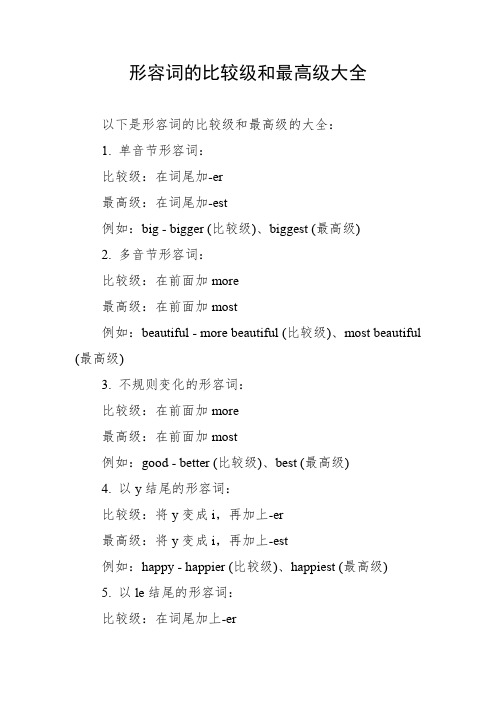
形容词的比较级和最高级大全以下是形容词的比较级和最高级的大全:1. 单音节形容词:比较级:在词尾加-er最高级:在词尾加-est例如:big - bigger (比较级)、biggest (最高级)2. 多音节形容词:比较级:在前面加more最高级:在前面加most例如:beautiful - more beautiful (比较级)、most beautiful (最高级)3. 不规则变化的形容词:比较级:在前面加more最高级:在前面加most例如:good - better (比较级)、best (最高级)4. 以y结尾的形容词:比较级:将y变成i,再加上-er最高级:将y变成i,再加上-est例如:happy - happier (比较级)、happiest (最高级)5. 以le结尾的形容词:比较级:在词尾加上-er最高级:在词尾加上-est例如:possible - more possible (比较级)、most possible (最高级)6. 少数不规则变化的形容词:比较级:在前面加more最高级:在前面加most例如:famous - more famous (比较级)、most famous (最高级)7. 特殊的比较级和最高级:例如:well - better (比较级)、best (最高级)8. 副词的比较级和最高级:比较级:在后面加-er最高级:在后面加-est例如:slowly - more slowly (比较级)、most slowly (最高级)以上是常见的形容词的比较级和最高级,但是也有一些不规则变化的形容词需要记忆。
同时,需要注意的是,有些形容词没有比较级和最高级,如unique。
形容词和副词的比较级和最高级(完美版)
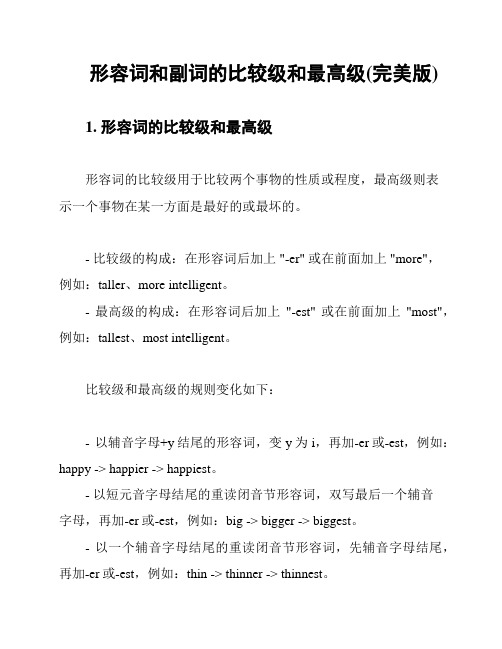
形容词和副词的比较级和最高级(完美版)1. 形容词的比较级和最高级形容词的比较级用于比较两个事物的性质或程度,最高级则表示一个事物在某一方面是最好的或最坏的。
- 比较级的构成:在形容词后加上 "-er" 或在前面加上 "more",例如:taller、more intelligent。
- 最高级的构成:在形容词后加上"-est" 或在前面加上"most",例如:tallest、most intelligent。
比较级和最高级的规则变化如下:- 以辅音字母+y结尾的形容词,变y为i,再加-er或-est,例如:happy -> happier -> happiest。
- 以短元音字母结尾的重读闭音节形容词,双写最后一个辅音字母,再加-er或-est,例如:big -> bigger -> biggest。
- 以一个辅音字母结尾的重读闭音节形容词,先辅音字母结尾,再加-er或-est,例如:thin -> thinner -> thinnest。
- 多音节和部分双音节形容词前加more或most,例如:beautiful -> more beautiful -> most beautiful。
2. 副词的比较级和最高级副词的比较级和最高级的构成方式与形容词类似,只是在形容词的基础上加上 "-ly" 构成副词。
- 比较级的构成:在副词后加上 "-er" 或在前面加上 "more",例如:faster、more quickly。
- 最高级的构成:在副词后加上 "-est" 或在前面加上 "most",例如:fastest、most quickly。
与形容词类似,副词的规则变化也遵循相同的规律。
形容词的比较级和最高级知识讲解及练习整理

形容词的比较级和最高级知识讲解及练习整理一、形容词的比较级和最高级在我们日常生活中,我们经常会遇到需要比较两个或多个事物的情况。
这时候,我们就需要用到形容词的比较级和最高级。
形容词的比较级和最高级可以帮助我们更准确地表达我们的意思,使我们的语言更加丰富多彩。
本文将详细讲解形容词的比较级和最高级的知识,并通过一些练习来帮助大家更好地掌握这一知识。
我们来了解一下什么是形容词的比较级和最高级。
形容词的比较级表示两个或多个事物在某一方面上的相对大小,而形容词的最高级则表示三个或三个以上的事物在某一方面上的绝对最大值。
形容词的比较级和最高级的构成方法是在形容词原级后面加上-er(如:big → bigger)或most(如:big → biggest)。
需要注意的是,有一些形容词在构成比较级和最高级时需要进行特殊处理,如:good→better,bad→worse,far→farther/further,many/much→more/most等。
接下来,我们通过一些练习来巩固对形容词比较级和最高级的理解。
1. 请写出下列形容词的比较级和最高级形式:(1) small(小的)→______(大)→______(最大的)(2) tall(高的)→______(矮)→______(最高的)(3) old(老的)→______(新的)→______(最老的)(4) far(远的)→______(近的)→______(最远的)(5) many/much(多的/多的)→______(少的/少的)→______(最多的/最多的)2. 请用所给形容词的比较级和最高级形式造句。
(1) This shirt is smaller than that one.(这条衬衫比那条小。
)(2) My brother is taller than me.(我哥哥比我高。
)(3) That book is the oldest I have.(那本书是我有的最早的。
常见形容词比较级最高级变化一览表
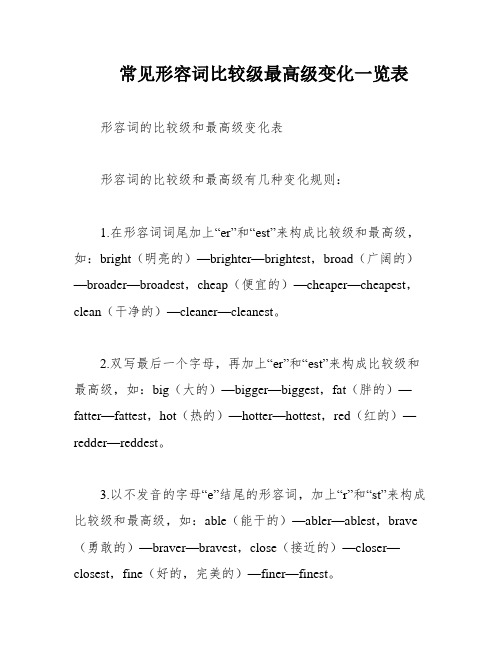
常见形容词比较级最高级变化一览表形容词的比较级和最高级变化表形容词的比较级和最高级有几种变化规则:1.在形容词词尾加上“er”和“est”来构成比较级和最高级,如:bright(明亮的)—brighter—brightest,broad(广阔的)—broader—broadest,cheap(便宜的)—cheaper—cheapest,clean(干净的)—cleaner—cleanest。
2.双写最后一个字母,再加上“er”和“est”来构成比较级和最高级,如:big(大的)—bigger—biggest,fat(胖的)—fatter—fattest,hot(热的)—hotter—hottest,red(红的)—redder—reddest。
3.以不发音的字母“e”结尾的形容词,加上“r”和“st”来构成比较级和最高级,如:able(能干的)—abler—ablest,brave (勇敢的)—braver—bravest,close(接近的)—closer—closest,fine(好的,完美的)—finer—finest。
4.以字母“y”结尾的形容词,把“y”改为“i”,再加上“er”和“est”来构成比较级和最高级,如:busy(忙碌的)—busier—busiest,dirty(脏的)—dirtier—dirtiest,dry(干燥的)—drier—driest,early(早的)—earlier—earliest。
5.双音节、多音节形容词,在单词前面加上“more”和“most”来构成比较级和最高级,如:afraid(害怕的)—more afraid—most afraid,beautiful(美丽的)—more beautiful—most beautiful。
6.不规则变化的形容词有:bad(坏的)—worse—worst,far(远的)—farther—farthest(far—further—furthest),good (好的)—better—best,ill(病的)—worse—worst。
形容词和副词的比较级和最高级(完美版)
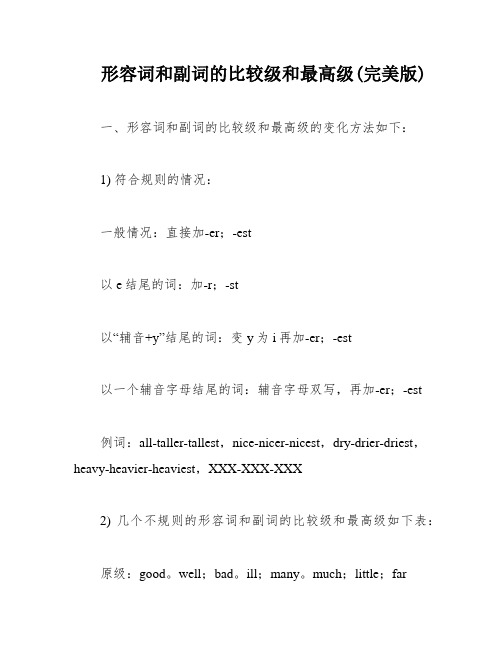
形容词和副词的比较级和最高级(完美版)一、形容词和副词的比较级和最高级的变化方法如下:1) 符合规则的情况:一般情况:直接加-er;-est以e结尾的词:加-r;-st以“辅音+y”结尾的词:变y为i再加-er;-est以一个辅音字母结尾的词:辅音字母双写,再加-er;-est例词:all-taller-tallest,nice-nicer-nicest,dry-drier-driest,heavy-heavier-heaviest,XXX-XXX-XXX2) 几个不规则的形容词和副词的比较级和最高级如下表:原级:good。
well;bad。
ill;many。
much;little;far二、形容词和副词比较级的用法:级别比较程度肯定表达方式和意义例句(备注)原级同等程度 As+原级+as (像……一样) XXX。
not + so (as) +原级+as (不如……那样) English is not so difficult as science。
比较级不同程度 (用于两者比较) 比较级+than (比……) XXX XXX。
比较级前面可以加much。
far。
even。
still。
a lot。
a little。
a bit等程度加深 I like pork better than beef。
最高级同一范围内的最高程度 The +比较级,the +比较级(越……,越……) XXX gets。
the XXX.The XXX reads。
the better their XXX。
This is because reading can XXX.The highest degree of something is expressed using the superlative form。
which is used for three or more things。
Forexample。
"Spring is the best season of the year." Another example is "Lin Tao jumped the farthest of all."When using the superlative form with an adverb。
(完整版)比较级和最高级列表
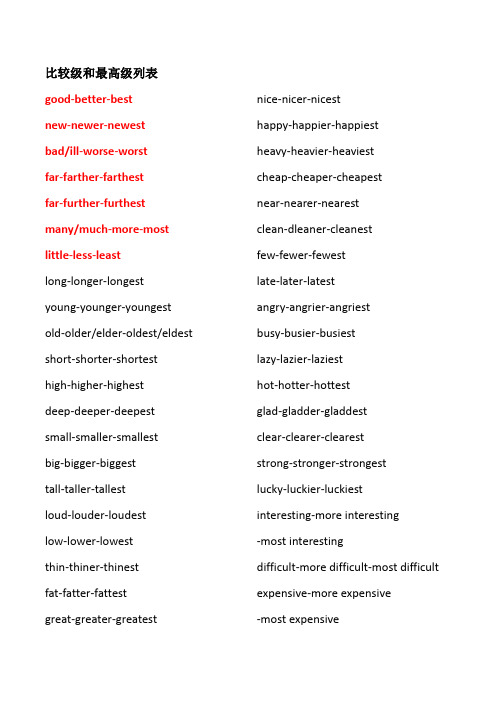
比较级和最高级列表good-better-bestnew-newer-newestbad/ill-worse-worstfar-farther-farthestfar-further-furthestmany/much-more-most little-less-leastlong-longer-longestyoung-younger-youngest old-older/elder-oldest/eldest short-shorter-shortesthigh-higher-highestdeep-deeper-deepestsmall-smaller-smallestbig-bigger-biggesttall-taller-tallestloud-louder-loudestlow-lower-lowestthin-thiner-thinestfat-fatter-fattestgreat-greater-greatest nice-nicer-nicesthappy-happier-happiestheavy-heavier-heaviestcheap-cheaper-cheapestnear-nearer-nearestclean-dleaner-cleanestfew-fewer-fewestlate-later-latestangry-angrier-angriestbusy-busier-busiestlazy-lazier-laziesthot-hotter-hottestglad-gladder-gladdestclear-clearer-cleareststrong-stronger-strongestlucky-luckier-luckiestinteresting-more interesting-most interestingdifficult-more difficult-most difficult expensive-more expensive-most expensive形容词比较级、最高级的构成一、规则变化1. 单音节词和少数双音节词(1)一般情况在原级词尾加-er构成比较级,加-est构成最高级。
形容词副词比较级最高级变化形式归纳(超全)
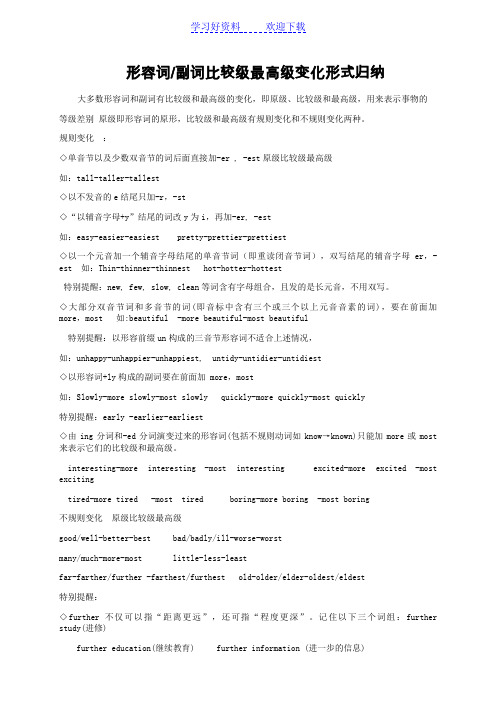
形容词/副词比较级最高级变化形式归纳大多数形容词和副词有比较级和最高级的变化,即原级、比较级和最高级,用来表示事物的等级差别原级即形容词的原形,比较级和最高级有规则变化和不规则变化两种。
规则变化:◇单音节以及少数双音节的词后面直接加-er , -est原级比较级最高级如:tall-taller-tallest◇以不发音的e结尾只加-r,-st◇“以辅音字母+y”结尾的词改y为i,再加-er, -est如:easy-easier-easiest pretty-prettier-prettiest◇以一个元音加一个辅音字母结尾的单音节词(即重读闭音节词),双写结尾的辅音字母er,-est 如:Thin-thinner-thinnest hot-hotter-hottest特别提醒:new, few, slow, clean等词含有字母组合,且发的是长元音,不用双写。
◇大部分双音节词和多音节的词(即音标中含有三个或三个以上元音音素的词),要在前面加more,most 如:beautiful -more beautiful-most beautiful特别提醒:以形容前缀un构成的三音节形容词不适合上述情况,如:unhappy-unhappier-unhappiest, untidy-untidier-untidiest◇以形容词+ly构成的副词要在前面加 more,most如:Slowly-more slowly-most slowly quickly-more quickly-most quickly特别提醒:early -earlier-earliest◇由ing分词和-ed分词演变过来的形容词(包括不规则动词如know→known)只能加more或most 来表示它们的比较级和最高级。
interesting-more interesting -most interesting excited-more excited -most excitingtired-more tired -most tired boring-more boring -most boring不规则变化原级比较级最高级good/well-better-best bad/badly/ill-worse-worstmany/much-more-most little-less-leastfar-farther/further -farthest/furthest old-older/elder-oldest/eldest特别提醒:◇further不仅可以指“距离更远”,还可指“程度更深”。
(完整版)比较级和最高级

(完整版)比较级和最高级一、形容词的比较级和最高级变化规则;1、规则变化:(1) 单音节词和少数双音节词一般在词尾加er或est:如: small ---smaller --- the smallest(2) 以不发音的e字母结尾的加r,或st:如: late --- later --- the latest(3) 以辅音字母加y结尾的变y为I加er或est:如: easy --- easier --- the easiest(4)以一个辅音字母结尾的重读闭音节词双写最后一个辅音字母再加er或est:如: big --- bigger --- the biggest以er,ow结尾的双音节词加er 或est如: slow --- slower --- the slowest(5) 多音节词前加more或most, 副词最高级前省略the.如: important --- more important --- the most important2.不规则变化good / well --- better --- the best 好bad / badly / ill --- worse --- the worst 坏many / much --- more --- the most 多little --- less --- the least 少old --- older / elder --- the oldest / the oldest 老, 旧far --- farther / further --- the farthest / the furthest 远常见形容词比较级、最高级变化一览表1.在形容词词尾加上“er”“est”构成比较级、最高级:bright(明亮的)—brighter—brightest broad(广阔的)—broader—broadest cheap(便宜的)—cheaper—cheapest clean (干净的)—cleaner—cleanestclever(聪明的)—cleverer—cleverest cold(寒冷的)—colder—coldest cool(凉的)—cooler—coolest dark(黑暗的)—darker—darkest deep(深的)—deeper—deepest fast(迅速的)—faster—fastestfew(少的)—fewer—fewest great(伟大的)—greater—greatest hard(困难的,硬的)—harder—hardest high(高的)—higher—highest kind(善良的)—kinder—kindest light(轻的)—lighter—lightest long(长的)—longer—longest loud(响亮的)—louder—loudestlow(低的)—lower—lowest near(近的)—nearer—nearest new(新的)—newer—newest poor(穷的)—poorer—poorestquick(快的)—quicker—quickest quiet(安静的)—quieter—quietestrich(富裕的)—richer—richest short(短的)—shorter—shortestslow(慢的)—slower—slowest small(小的)—smaller—smallest smart(聪明的)—smarter—smartest soft(柔软的)—softer—softest strong(强壮的)—stronger—strongest sweet (甜的)—sweeter—sweetest tall(高的)-taller-tallest thick(厚的)—thicker—thickest warm(温暖的)—warmer—warmest weak(弱的)—weaker—weakest young(年轻的)—younger—youngest2.双写最后一个字母,再加上“er”“est”构成比较级、最高级:big(大的)—bigger—biggest fat(胖的)—fatter—fattesthot(热的)—hotter—hottest red(红的)—redder—reddestsad(伤心的)—sadder—saddest thin(瘦的)—thinner—thinnestwet(湿的)—wetter—wettest mad(疯的)—madder—maddest3.以不发音的字母e结尾的形容词,加上“r”“st”构成比较级、最高级:able(能干的)—abler—ablest brave(勇敢的)—braver—bravest close(接近的)—closer—closest fine(好的,完美的)—finer—finest large(巨大的)—larger—largest late(迟的)—later—latestnice(好的)—nicer—nicest ripe(成熟的)—riper—ripestrude(粗鲁的)—ruder—rudest safe(安全的)—safer—safest strange(奇怪的)—stranger—strangest wide(宽广的)—wider—widest wise(睿智的,聪明的)—wiser—wisest white(白的)—whiter—whitest4.以字母y结尾的形容词,把y改为i,再加上“er”“est”构成比较级、最高级:busy(忙碌的)—busier—busiest dirty(脏的)—dirtier—dirtiest dry(干燥的)—drier—driest early(早的)—earlier—earliest easy(容易的)—easier—easiest friendly(友好的)—friendlier—friendliest funny(好玩的)—funnier—funniest happy(开心的)—happier—happiest healthy(健康的)—healthier—healthiest heavy(重的)—heavier—heaviest hungry(饿的)—hungrier—hungriest lazy(懒惰的)—lazier—laziestlucky(幸运的)—luckier—luckiest naughty(调皮的)—naughtier—naughtiest noisy(嘈杂的)—noisier—noisiest pretty (美丽的)—prettier—prettiest silly(傻的)—sillier—silliest spicy(辣的)—spicier—spiciestthirsty(渴的)—thirstier—thirstiest ugly(丑的)—uglier—ugliest4.双音节、多音节形容词,在单词前面加上“more”“most”构成比较级、最高级:afraid(害怕的)—more afraid—most afraidbeautiful(美丽的)—more beautiful—most beautifulcareful(仔细的)—more careful—most carefulcheerful(开心的)—more cheerful—most cheerfulcrowded(拥挤的)—more crowded—most crowdeddangerous(危险的)—more dangerous—most dangerous delicious(美味的)—more delicious—most deliciousdifficult(困难的)—more difficult—most difficultexciting(令人兴奋的)—more exciting—most excitingexpensive(昂贵的)—more expensive—most expensivefamous(著名的)—more famous—most famousfrightened(受惊的)—more frightened—most frightened frightening(令人害怕的)—more frightening—most frighteninghard-working(勤奋的)—more hard-working—most hard-workinghelpful(有帮助的)—more helpful—most helpfulhonest(诚实的)—more honest—most honestimportant(重要的)—more important—most importantinteresting(有趣的)—more interesting—most interesting polite(有礼貌的)—more polite—most politeterrible(可怕的)—more terrible—most terribletired(累的)—more tired—most tired5.不规则变化的形容词:bad(坏的)—worse—worst good(好的)—better—bestfar(远的)—farther—farthest (far—further—furthest)ill(病的)—worse—worst little(少的)—less—leastmany(多的)—more—most much(多的)—more—most old(年老的)—older—oldest ( old—elder—eldest)well(好的,身体好的)—better—best一. 写出下列形容词或副词的比较级和最高级.bad ________________ ______________________________clean ________________ ______________________________ famous ______________ _______________________dirty _________________ ______________________________big __________________ _____________________________small _________________ ______________________________heavy _____________ ______________________little __________________ ______________________________hard __________________ ______________________________ happy _________________ ______________________________far ___________________ ______________________________ expensive _____________________ ________________________________ well _________________ ______________________________easy __________________ ______________________________ wide ___________________ _______________________________ young _________________ ________________________________ rude ___________________ ________________________________ cheap ___________________ _______________________________ ugly __________________ _________________________________ busy ___________________ ________________________________ old ____________________ _________________________________ noisy __________________ _________________________________ interesting _____________________ _______________________________ hot ____________________ _________________________________ cold ___________________ _________________________________ many __________________ ________________________________ bright __________________ _______________________________ boring __________________ _______________________________ difficult _______________________ ________________________________ beautiful _______________________ _____________________________thin _____________________ _______________________________ good ____________________ _______________________________ strong____________________ ______________________________ high _________________ _______________________warm ________________ _______________________late __________________ _______________________weak _________________ ______________________tall ___________________ ______________________short __________________ ______________________loud ___________________ ______________________lazy ___________________ ______________________quick __________________ ______________________angry __________________ ______________________clever __________________ ______________________smart __________________ ______________________low ____________________ __________________二、选择填空1. Which does Jimmy like _____ , Chinese or Art?A. wellB. bestC. betterD. much2. The Changjiang River is one of _____ in the world.A. the longest riverB. longest riversC. the longest riversD. longer rivers3. _____ of the two women is Mrs Brown.A. The beautifulB. The more beautifulC. More beautifulD. The most beautiful4. My mooncake is nicer _____ his.A. likeB. withC. forD. than5. You are fatter than _____ .A. heB. hisC. himD. he is tall6. He jumps _____ of the three.A. farB. furtherC. farthestD. furthest7. My hair is longer than _____ .A. my sisterB. KateC. my brother’sD. Lucys’8. There are _____ paper here .Please bring some.A. littleB. lessC. fewerD. a little9. The pen is _____ than that one.A. more cheapB. cheapC. much cheaperD. quite cheaper10.Tom speaks Chinese _____ better than Jimmy.A. moreB. veryC. a lot ofD. much11.There are _____ girls in Class Two than in Class Four.A. moreB. nicestC. mostD. best12.It’s too _____ for you to do that.A. easyB. more dangerousC. harderD. the easiest13.Who has _____ apples now, Jim, Lily or Lucy?A. muchB. biggestC. betterD. the most14.You have more rulers than me. But _____ are nicer than _____ .A. mine, yoursB. mine, yourC. my, yoursD. my, your15.Tingting is _____ than Meimei, but Meimei is _____ than Tingting.A. all, strongerB. taller, strongestC. tallest, strongD. taller, stronger16.Mother is _____ in my family.A. busyB. busierC. the busiestD. more busy17.There are _____ in the park on Sunday.A. more childrenB. a lot of peopleC. much men and womenD. many peoples18.-This blue sweater is too big for me .-Will you please show me a _____ one?A. smallB. smallerC. the smallestD. smallest19.No one is _____ Mary in the class.A. so tallest asB. as taller asC. so high asD. so tall as20. This bike is _____ than that one.A. twenty yuan dearB. twenty yuan dearerC. dear twenty yuanD. dearer twenty yuan[参考答案] CCDDA CDBCD AADAD CBBDB三、用所给词的适当形式填空1.Your classroom is _____ (wide) and _____ (bright) than ours.2.There are _____ (few) hours of sunlight a day in winter than in summer.3.Which do you like _____ (well) , maths or chemistry?4.This is the _____ (good) film I have ever seen.5.Africa is the second _____ (large) continent.6.What he said made his mother much _____ (angry) .7.I’m not as _____ (careful) as he.8.We’ve got as _____ (many) books as we need.9.Pratice as _____ (much) as you can.10.They have done _____ (much) work with _____ (little) money.11.You’re the _____ (kind) person I’ve ever met.12.He is _____ (young) than his two sisters.13.The _____ (old) I get, the _____ (strong) I seem to feel.14.The weather is getting _____ (warm) and _____ (warm) .15.Summer is _____ (hot) season of the year.[参考答案] 1. wider, brighter 2. fewer 3. better 4. best 5. largest 6. angry 7. careful 8. many 9. much 10. more, less 11. kindest 12. younger 13. older, stronger, 14. warmer, warmer 15. the hottest。
常见形容词的比较级和最高级有哪些
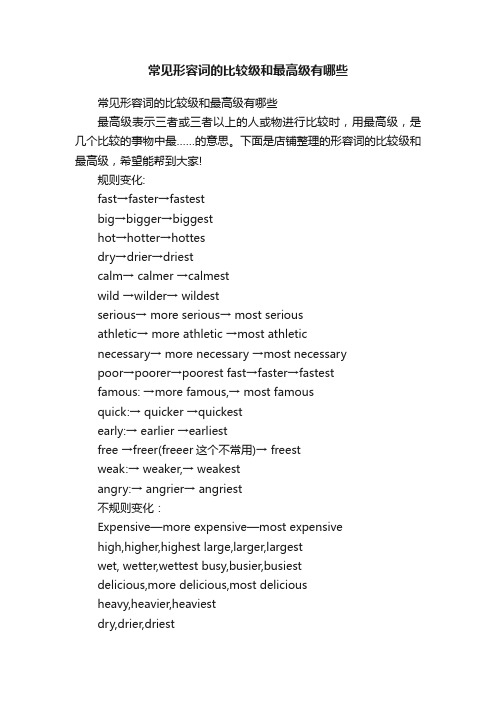
常见形容词的比较级和最高级有哪些常见形容词的比较级和最高级有哪些最高级表示三者或三者以上的人或物进行比较时,用最高级,是几个比较的事物中最……的意思。
下面是店铺整理的形容词的比较级和最高级,希望能帮到大家!规则变化:fast→faster→fastestbig→bigger→biggesthot→hotter→hottesdry→drier→driestcalm→ calmer →calmestwild →wilder→ wildestserious→ more serious→ most seriousathletic→ more athletic →most athleticnecessary→ more necessary →most necessarypoor→poorer→poorest fast→faster→fastestfamous: →more famous,→ most famousquick:→ quicker →qu ickestearly:→ earlier →earliestfree →freer(freeer这个不常用)→ freestweak:→ weaker,→ weakestangry:→ angrier→ angriest不规则变化:Expensive—more expensive—most expensivehigh,higher,highest large,larger,largestwet, wetter,wettest busy,busier,busiestdelicious,more delicious,most deliciousheavy,heavier,heaviestdry,drier,driesteasy easier easiestlazy lazier laziestpretty prettier prettiestnaughty naughtier naughtiestmealy mealier mealiestearly earlier earliestthirsty thirstier thirstiestfar→farther→farthestfar→further→furthestDull—duller--dullestLoud-louder--loudestBoring—more boring—most boringCreative—more creative—most creativeWarm---warmer--warmestgood / well→better→bestbad / ill→worse→worstmany / much→more→mostlittle→less→leastlate→later→ / latestlate→latter→last【拓展】关于形容词和副词的比较级一、含义1. 大多数形容词和副词有三个等级:原级、比较级、最高级: good – better - best2. 比较级:表示两者(人或物)之间的比较。
(完整)形容词和副词的比较级和最高级(完美版)
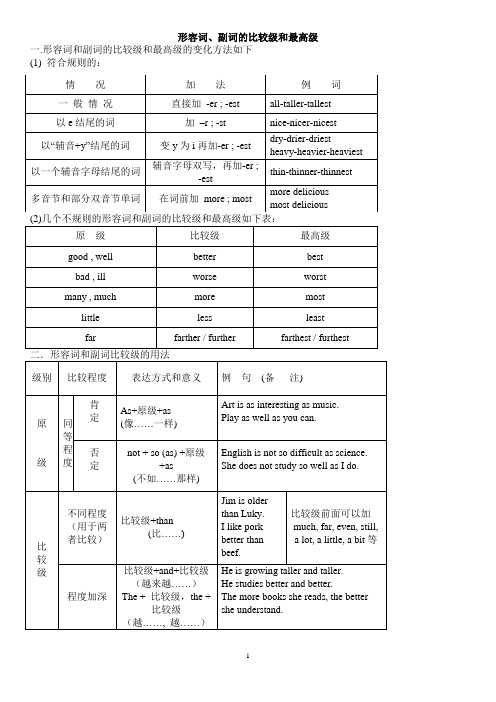
形容词、副词的比较级和最高级一.形容词和副词的比较级和最高级的变化方法如下(1) 符合规则的:( 1)和冠词连用the +形容词原级+v(复),指一类人或物the +形容词比较级,指两者中“较…的”的那一个,eg. the younger of thea/ an +形容词比较级eg. The pen is expensive. I want a cheaper one.( a) +most+形容词最高级“非常…”eg. a most beautiful city( 2 ) 相关结构a. 原级比较:肯定句as….as…., 否定句not so / as….as…..b.比较句:比较级+than….或more (less) ….than…..The furniture in this shop is less beautiful than that in that shop.c.比较级+and+比较级或more and more+比较级“越来越… ”richer and richer, more and more interestingd. The more….., the more…..“越…,越…”The more you look at the picture, the better you will like it.e. 比较级+than any other +n. (单)(适用于范围一致时)(all) other +n.(复)any +n.(单) (适用于范围不一致时)He is taller than any other student / all other students in his class.any student in my class.f. 倍数表达法。
A is three(four, etc.)times the size(height, length etc.)of B.A is three(four, etc.)times as big(high, long, etc.)as B.A is three (four, etc.)times bigger(higher, longer, etc.)than B.用times 表倍数通常用于三倍以上,两倍可以用twice或double.The new building is four times the size (the height)of the old one.Asia is four times as large as Europe.Your school is three times bigger than ours.g. 最高级+of/ in/ among….He is the tallest of the three/ among them/ in is class.形容词、副词的比较级和最高级专项练习(一)写出下列形容词与副词的比较级与最高级形式:long __ wide __ ___ fat _ ___ heavy _____ ____ slow _____ ____ few _____ ____ brightly ___ _____ important ___ _____ far ____ ______ quickly ____ ____ happy ___ ____ many ___ ____ interesting __ __good ___ ___(二)用所给词的正确形式填空:1. He ran ______ than all the others. He ran _______ of all. ( fast )2. James played as ______ as you. Mary played _______of all. ( well )3. She waited ________ than she usually did. ( long )4. I walked _______ than the rest. I walked _______ of all. ( far )5. My friend came ________ than Pual and Mike. ( late )6. Among the three boys he works ________. ( hard )7. Bob left school ______ in his class yesterday. ( late )8. He swims as ______ as I do. ( badly )9. Who did _______ in the 100-metre race, Jim or Tim? ( badly )10. Both Li Ming and Li Hong sang __________, but I sang _______ of all. ( badly )11. Peter is as _______ as Tom. Benny is _____ than Tom. David is ______ of all. ( fat )12. Li Li found _________ mushrooms than I did. ( many )13. The elephant is ________ than any other animals. ( big )14. Man is ________ than animals. ( much clever )15. Lesson Two is a bit ________ than Lesson One. ( easy )16. I’m _______ boy under the sun. ( happy )17. Today is ________ than yesterday. ( hot )18. An elephant is _______ than a tiger. It is _______ animal on land. ( big )19. Mr. Li is _______ than your uncle. ( thin )20. Which book is _________, yours or mine? ( thick )21. This park is much _______ than that one. ( beautiful )22. The first book is more useful than the second one.The second book is ______ than the first one. ( useful )23. Allan is _______ of the three boys. ( strong )24. His marks are _______ than his friend’s ( bad )25. It is _______ to do this maths problem than to do that one. ( easy )26. My house is ________ to the farm than yours. ( far )27. My work is more important than yours. Your work is ________ than mine. ( important )28. Climbing this hill is _________. Climbing that hill is ________. Climbing Mt. Everest is _______ of all. ( dangerous )29. Mt. Everest is _________ than the Mont-Blanc. ( high )30. My mother drives very carefully. She is a _________ driver than my father. ( careful ).31. Of the two girls, I find Lucy the _______ (clever).32. Gold(黄金) is ______ (little) useful than iron(铁).33. My sister is two years _______ (old ) than I.34. John’s parents have four da ughters, and she is the _____ (young) child.35. The _____ (cheap) bags are the not usually the best ones.36. The short one is by far _______ expensive of the five.37. The boy is not so ______ (interesting) as his brother.38. Dick sings _____ (well), she sings ______(well) than John, but Mary sings______(well) in her class.39. She will be much ______ (happy) in her mew house.40. This dress is ______ that.(twice, as…as…, expensive)(三)选择填空:1. He feels _____ today than yesterday. A. tired B. more tired C. more tireder D. much tired2. Which do you like _____, coffee, tea or milk? A. the worst B. worse C. the worse D. worst3. Of the two toys, the child chose_____.A. the expensive oneB. one most expensiveC. a least expensiveD. the most expensive of them4. The line is ____ than that one. A. more longer B. not longer C. much more longer D. many more longer5. The earth is _____ the moon.A. as 49 times big asB. 49 times as bigger asC. 49 times as big asD.as big as 49 times6. The book is ____ of the two. A. thinner B. the thinner C. more thinner D. the thinnest7. She looks _____ than she does. A. the more older B. very older C. much older D. more older8. The garden is becoming ______.A. more beautiful and moreB. more beautiful and beautifulC. more and more beautifulD. more beautiful and beautifuler9. They competed(比赛)to see who could work _____.A. the fastest and bestB. the faster and the betterC. fastest and betterD. faster and better10.______ hurry, _______speed. A. More, less B. Much, little C. The more, the less D. The much, the little11. This kind of coffee is different ______.A. and it is also betterB. and better than the otherC. but also than othersD. from the other, and better(四)翻译句子:1.本书跟那本书一样有趣。
形容词、副词的比较级与最高级用法详解精选全文完整版

可编辑修改精选全文完整版形容词、副词的比较级与最高级用法详解一、形容词、副词比较级、最高级构成大多数的形容词、副词都具有原级、比较级和最高级三种形式。
而形容词、副词的比较级、最高级构成方式分规则变化和不规则变化。
其规则变化的方式详见下面个表:(一)规则变化:(1) 直接在词尾加-er, -est(2) 以不发音字母e 结尾的,在词尾加-r , -st(3)以“辅音字母+y“结尾的,把y 变i,再加-er , -est(4) 以辅音字母结尾的重读闭音节词汇,双写最后一个辅音字母,再加-er , -est(5) 部分双音节和多音节词,在其前加more, most(二)、不规则变化:比较级、最高级具有不规则变化形式的形容词和副词比较少,因此,需要大家逐一认真记忆。
详见下表:【妙记顺口溜】“坏”“病”两“多”和两“好”,一是“远”来,二是“老”,little 是“少”不是“小”。
二、形容词、副词比较级和最高级用法(一)形容词、副词比较级用法形容词、副词的比较级主要对两个的人或物在某种程度、性质上进行比较。
常见的形容词副词比较级用法如下:1.同级比较① A+be/v+as+原级+as+B A和B一样This room is as large as that one .这间房子和那间一样大(形容词)Tom writes as carefully as Kate.汤姆写字跟凯特一样认真。
(副词)②A+be/V+not+as(so)+级+as +B A 不如BTigers aren't as(so) dangerous as lions.老虎不如狮子危险。
(形容词)Mary didn't finish the work as(so) well as Lucy.玛丽完成这项工作不如露西好。
(副词)2.差极比较①A+be/v+比较级+B A比B更......This pen is newer than that one.这支钢笔比那支新。
英语常见形容词及比较级最高级变化一览表

形容词第一章比较级、最高级变化一览表规则变化1.单音节以及少数双音节的词尾加上“er”“est”构成比较级、最高级:bright明亮的—brighter—brightest broad广阔的—broader—broadestcheap便宜的—cheaper—cheapest clean干净的—cleaner—cleanest clever聪明的—cleverer—cleverest cold寒冷的—colder—coldestcool凉的—cooler—coolest dark黑暗的—darker—darkestdear贵的—dearer—dearest deep深的—deeper—deepestfast迅速的—faster—fastest few少的—fewer—fewestgreat伟大的—greater—greatest hard困难的,硬的—harder—hardesthigh高的—higher—highest kind善良的—kinder—kindestlight轻的—lighter—lightest long长的—longer—longestloud响亮的—louder—loudest low低的—lower—lowestnear近的—nearer—nearest new新的—newer—newestpoor穷的—poorer—poorest quick快的—quicker—quickestquiet安静的—quieter—quietest rich富裕的—richer—richestshort短的—shorter—shortest slow慢的—slower—slowestsmall小的—smaller—smallest smart聪明的—smarter—smartestsoft柔软的—softer—softest strong强壮的—stronger—strongest sweet甜的—sweeter—sweetest tall高的-taller - tallest thick厚的—thicker—thickest warm温暖的—warmer—warmestweak弱的—weaker—weakest young年轻的—younger—youngest2以一个元音加一个辅音字母结尾的单音节词即重读闭音节词,双写结尾的辅音字母er,-estbig大的—bigger—biggest fat胖的—fatter—fattesthot热的—hotter—hottest red红的—redder—reddestsad伤心的—sadder—saddest thin瘦的—thinner—thinnestwet湿的—wetter—wettest mad疯的—madder—maddest特别提醒:new, few, slow, clean等词含有字母组合,且发的是长元音,不用双写;3.以不发音的字母e结尾的形容词,加上“r”“st”构成比较级、最高级:able能干的—abler—ablest brave勇敢的—braver—bravestclose接近的—closer—closest fine好的,完美的—finer—finestlarge巨大的—larger—largest late迟的—later—latest nice好的—nicer—nicest ripe成熟的—riper—ripestrude粗鲁的—ruder—rudest safe安全的—safer—safest strange奇怪的—stranger—strangest wide宽广的—wider—widestwise睿智的,聪明的—wiser—wisest white白的—whiter—whitest4.“以辅音字母+y”结尾的词改y为i,再加-er, -estbusy忙碌的—busier—busiest dirty脏的—dirtier—dirtiest dry干燥的—drier—driest early早的—earlier—earliesteasy容易的—easier—easiest friendly友好的—friendlier—friendliest funny好玩的—funnier—funniest happy开心的—happier—happiest healthy健康的—healthier—healthiest heavy重的—heavier—heaviest hungry饿的—hungrier—hungriest lazy懒惰的—lazier—laziestlucky幸运的—luckier—luckiest naughty调皮的—naughtier—naughtiest noisy嘈杂的—noisier—noisiest pretty美丽的—prettier—prettiestsilly傻的—sillier—silliest spicy辣的—spicier—spiciest thirsty渴的—thirstier—thirstiest ugly丑的—uglier—ugliest5.双音节、多音节形容词即音标中含有三个或三个以上元音音素的词,在单词前面加上“more”“most”构成比较级、最高级:afraid害怕的—more afraid—most afraidbeautiful美丽的—more beautiful—most beautifulcareful仔细的—more careful—most carefulcheerful开心的—more cheerful—most cheerfulcrowded拥挤的—more crowded—most crowdeddangerous危险的—more dangerous—most dangerousdelicious美味的—more delicious—most deliciousdifficult困难的—more difficult—most difficultexciting令人兴奋的—more exciting—most excitingexpensive昂贵的—more expensive—most expensivefamous着名的—more famous—most famousfrightened受惊的—more frightened—most frightenedfrightening令人害怕的—more frightening—most frighteninghard-working勤奋的—more hard-working—most hard-workinghelpful有帮助的—more helpful—most helpfulhonest诚实的—more honest—most honestimportant重要的—more important—most importantinteresting有趣的—more interesting—most interestingpolite有礼貌的—more polite—most politeterrible可怕的—more terrible—most terribletired累的—more tired—most tired特别提醒:以形容前缀un构成的三音节形容词不适合上述情况,如:unhappy-unhappier-unhappiest, untidy-untidier-untidiest6. 以形容词+ly构成的副词要在前面加 more,mostSlowly-more slowly-most slowly quickly-more quickly-most quickly特别提醒:early -earlier-earliest7. 由ing分词和-ed分词演变过来的形容词包括不规则动词如know→known只能加more或most来表示它们的比较级和最高级;interesting- more interesting -most interestingexcited- more excited- most excitingtired- more tired - mosttiredboring-more boring-most boring不规则变化bad坏的—worse—worstfar远的—farther—farthest far—further—furthestgood好的—better—bestill病的—worse—worstlittle少的—less—leastmany多的—more—mostmuch多的—more—mostold年老的—older—oldest old—elder—eldestwell好的,身体好的—better—best特别提醒:◇further不仅可以指“距离更远”,还可指“程度更深”;记住以下三个词组:further study 进修further education继续教育further information 进一步的信息◇elder仅用于同辈之间的排行,如: elder sister姐姐 elder brother 哥哥◇less作为“更少”仅用来修饰不可数名词,修饰可数名词表示“更少”要用fewer;第二章形容词副词比较级较难考点◇少数单音节词前面加 more, most 构成比较级和最高级,这类形容词一般为表语形容词和由过去分词变成的形容词afraid -more afraid, most afraid tired - more tired , most tiredfond - more fond , most fond glad -more glad , most gladbored - more bored , most bored pleased---- more pleased , most pleased ◇下列形容词和副词的比较级和最高级有两种形式,即:既可加-er/-est也可加more/most strict, often, friendly, clever◇下列形容词和副词没有比较级和最高即表示“最高程度”或“绝对状态”的形容词和副词没有比较级和最高级如:empty, wrong, perfect, unique, extreme, excellent, favourite, true, right, correct, extremely ...◇比较应在同类事物之间进行;误:Your English is better than me.正:Your English is better than mine.◇比较级前可以有一个表示程度的状语,最常见的三大修饰词是:a little, much, even; 以下单词也可用来修饰:any, far, still, a lot, yet, rather;My sister is a little taller than me.Their house is much larger than ours.另外,名词短语也可修饰比较级,说明程度;I’m three years older than he.特别提醒:very, quite, too不可修饰比较级;◇避免重复使用比较级;误:He is more kinder to small animals than I.正:He is much kinder to small animals than I.误:He is more cleverer than his brother.正:He is cleverer than his brother.◇比较要符合逻辑,在同一范围内比较时,避免将主语含在比较对象中,这时需使用other来排除自身;误:China is larger that any country in Asia.正:China is larger than any other country in Asia.误:John studies harder than any student in his class.正:John studies harder than any other student in his class.正:John studies harder than any of the other students in his class.正:John studies harder than anyone else in his class.◇比较要遵循前后一致的原则,注意前后呼应;The population of Shanghai is larger than that of Beijing.It is easier to make a plan than to carry it out.◇序数词通常只修饰最高级;Africa is the second largest continent.The Yellow River is the second longest river in China.This is the third most popular song of Michael Jackson.◇为避免重复,我们通常用that, those, one, ones代替前面出现的名词;that代替可数名词单数和不可数名词,those代替可数名词复数;one既可指人又可指物,只能代替可数名词; The weather in China is different from that in America.The book on the table is more interesting than that或the oneon the desk.A box made of steel is stronger than one made of wood.误:In winter, the weather of Beijing is colder than it of Shanghai.正:In winter, the weather of Beijing is colder than that of Shanghai.◇“否定词 + 比较级”相当于最高级;----Wait until we get a satisfactory reply, will you----I couldn't agree more. The idea sounds great to me.Nothing is so easy as this. =Nothing is easier than this. =This is the easiest thing. ◇比较级前一般不加冠词;但表示两者中较突出者,且比较级后又有名词或出现了of the two,这时比较级前一定要加the;He is the taller of the two.Of the two jobs,he chose the harder.Which is the younger one, Lily or Lucy试比较:Which is larger, Canada or AustraliaWhich is the larger country, Canada or AustraliaShe is taller than her two sisters.She is the taller of the two sisters.◇不含than 的比较级前可加不定冠词修饰,构成“a/an+比较级+单数可数名词”表示“一个更……的人/物”;Why don’t you use a sharper knife 你为什么不用一把更锋利的刀呢◇比较级than 后应用人称代词的主格,但非正式语体中常用宾格;He is taller than I/me.◇为避免重复,比较级中同样的动词用助动词do, does, did替代;I spend less time doing homework than John does.She tells more funny jokes than we do.以下内容不是初中教学的重点,仅供拓展之用;◇形容词most前面没有the,不表示最高级的含义,只表示“非常”;It is a most important problem.=It is a very important problem.◇倍数表达法▲A is threefour, etc.times the sizeheight, length etc.of B.The new building is four times the sizethe heightof the old one.这座新楼是那座旧楼的四倍大高/这座新楼比那座旧楼大高三倍;▲A is threefour, etc.times as bighigh, long, etc.as B.Asia is four times as large as Europe. 亚洲是欧洲的四倍大/亚洲比欧洲大三倍;▲A is three four, etc.times biggerhigher, longer, etc.than B.Your school is three times bigger than ours.你们的学校比我们的学校大三倍;用times 表倍数通常用于三倍以上,两倍可以用twice或double.第三章形容词副词比较级最高级重点句型归纳◇句型一:形容词或副词比较级+than…□注意事项:该句型为比较级的最基本句型;只要看到than,即可确定前面使用比较级;He is taller than I am.The boy does his homework more carefully than the girl.◇句型二:less + 形容词的原级 + than□注意事项:该句型表示“不如、不及”,特别需要注意的是,less本身就是little的比较级,后面必须跟形容词的原级,否定就造成了比较级的重复使用;This computer is less expensive than that one.◇句型三:as +形容词或副词的原级+ as□注意事项:该句型表示对比的两者程度相当,as之间必须跟形容词或副词的原级,决不能使用比较级;此外,还要确定使用形容词还是副词;确定的依据就是根据第一个as前的动词,如果是系动词如be,感官动词look, sound, smell, taste, feel等,那么就用形容词的原级,如果前面的动词是一般的实义动词,那么就必须用副词的原级修饰动词;This lesson is as easy as that one.Lucy talks with old people as politely as her sister.特别提醒:as…as之间也可以跟名词,句型如下:☆as +形容词+ a/an +单数名词+asHe is as kind a person as his father. 他和他爸爸一样都是善良的人;☆as + many/much+不可数名词/可数名词复数+asI can carry as much paper as you can. 你能搬多少纸,我也能;I have as many books as you do. 我的书和你的一样多;We’ll give you as much help as we can. 我们将尽我们所能给你帮助;其它几个关于as…as的句型:☆as … as one can:尽其所能He began to run as fast as he could.☆as … as possible:尽可能Please helpusas quickly as possible.☆as soon as…一……就……He will call me as soon as he comes here.◇句型四:not as/so +形容词或副词的原级+ as□注意事项:该句型表示“前者不如后者……”,往往可以与句型一和句型二替换;第一个as可以换为so; This classroom is not as bright as yours.I cannot run as fast as you.◇句型五:the +形容词或副词最高级+ in / of / among +比较范围□注意事项:如果这里为副词最高级,前面的the常常省略;介词in和of的用法完全不一样;in表示“在某一范围内”,如:in the classroom,in the world;of表示“在同类之间”,of后面的词与主语同类,另名词前一般有冠词the;among表示“在三者或三者以上之间”,among后接代词或没有修饰语的名词;The Changjiang River is the longest river in our country.Peter is the tallest of the six students.This picture is the most beautiful among these.◇句型六:one of + 形容词最高级+可数名词复数形式□注意事项:one of有三大考点:1. 后跟形容词最高级;2. 后接可数名词复数形式;3. 作主语时主语为one,谓语动词用单数形式;One of the smallest dinosaurs was about one metre long.◇句型七:比较级+and +比较级 / more and more +多音节词的原级□注意事项:该句型表示“越来越……”,如果该形容词比较级构成形式加er,则用前面的句型;如果该形容词比较级加more构成,则用后面的句型;It is getting hotter and hotter.The girl is becoming more and more beautiful.◇句型八:the +比较级+…, the +比较级+…□注意事项:该句型意思为“越……就越……”,表示两种情况同时变化;The more you eat, the fatter you will be.In the test, the more careful you are, the fewer mistakes you will make.◇句型九:be different from□注意事项:该句型没有运用比较级,但也是对两者事物进行比较;注意前后比较需在同类事物中进行; My schoolbag is different from yours.◇句型十:the same as… / the same…as…□注意事项:该句型同样没有运用比较级,表示两者之间具有共同特性;注意这里的as和same为固定搭配,不能随便变换;I don’t want to buy the same things as Amy did.◇句型十一:比较级+than + any other +名词单数形式□注意事项:any other 后面跟单数名词,表示“任何别的”,即主语在范围内,必须把自身从这一范围内除去,否则逻辑上不通;如果主语不在这一范围内,那么要把other去掉,只用any即可; Shanghai is larger than any other city in China.上海在中国这个范围内,所以用any otherShanghai is larger than any city in Jiangsu. 上海不在江苏,所以只需用any◇句型十二:比较级+than + the other +名词复数形式□注意事项:该句型相当于any other +名词单数形式,常用来进行同义句改写;该句型与句型十一虽然波表面上都是比较级,但实际上相当于最高级;以下三句表达的是同一个意思;Daniel is the most hard-working student in our class.Daniel is more hard-working than any other student in our class.Daniel is more hard-working than the other students in our class.特别提醒:表示两者人或物比较时,比较的对象应是同类事物,不同类的事物之间无法进行比较;。
(完整word版)英语比较级和最高级

形容词比较级和最高级的形式一、形容词比较级和最高级的构成形容词的比较级和最高级变化形式规则如下构成法原级比较级最高级①一般单音节词末尾加和②单音节词如果以结尾,只加和③闭音节单音节词如末尾只有一个辅音字母,须先双写这个辅音字母,再加和bighot sadderbiggerhotter saddestbiggesthottest④少数以或结尾的双音节词,末尾加和以结尾的词,如前是辅音字母,把y变成i,再加和,以结尾的词仍只加和CleverNarrowNoble angrierCleverernarrowernobler angriestcleverestnarrowestnoblest⑤其他双音节和多音节词都在前面加单词more和most different moredifferent mostdifferent1) The most high 〔A〕mountain in 〔B〕the world is Mount Everest,which is situated 〔C〕in Nepal and is〔D〕 .2) This house is spaciouser 〔A〕than that 〔B〕white 〔C〕one I bought in Rapid City,South Dakota 〔D〕last year.3) Research in the social 〔A〕sciences often proves difficulter 〔B〕than similar 〔C〕work in the physical 〔D〕sciences.二、形容词比较级或最高级的特殊形式:1. 三个或三个以上音节的形容词只能加more和most只能说more beautiful而不能说beautifuller; 只能说the most beautiful而不能说beautifullest。
但是,以形容前缀结尾的三音节形容词不适合上述情况,如unhappy,untidy,我们可以说:unhappier→unhappiest, untidier→untidiest2. 由分词和分词演变过来的形容词(包括不规则动词如know→known)只能加more或most来表示它们的比较级和最高级more(most) striking, more(most) interesting, more(most) wounded, more(most)worn等。
(完整版)高中英语的比较级和最高级用法总结
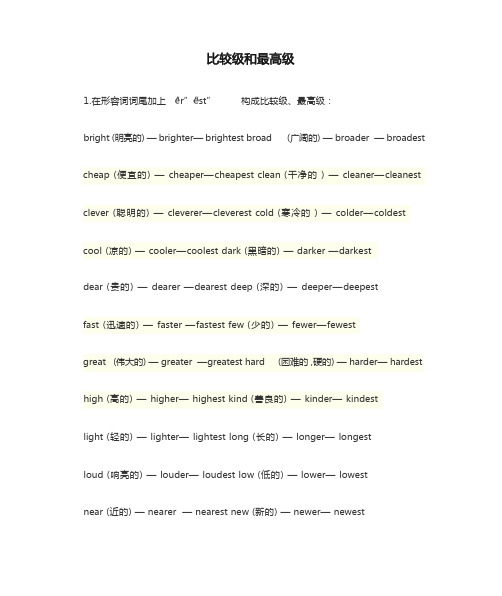
1.在形容词词尾加上r”st” 构成比较级、最高级:bright (明亮的) — brighter— brightest broad (广阔的) — broader — broadest cheap (便宜的) — cheaper—cheapest clean (干净的 ) — cleaner—cleanest clever (聪明的) — cleverer—cleverest cold (寒冷的 ) — colder—coldest cool (凉的) — cooler—coolest dark (黑暗的) — darker —darkestdear (贵的) — dearer —dearest deep (深的) — deeper—deepestfast (迅速的) — faster —fastest few (少的) — fewer—fewestgreat (伟大的) — greater —greatest hard (困难的 ,硬的) — harder— hardest high (高的) — higher— highest kind (善良的) — kinder— kindestlight (轻的) — lighter— lightest long (长的) — longer— longestloud (响亮的) — louder— loudest low (低的) — lower— lowestnear (近的) — nearer — nearest new (新的) — newer— newestpoor (穷的) — poorer — poorest quick (快的) — quicker —quickest quiet (安静的) — quieter—quietest rich (富裕的) — richer— richest short (短的) — shorter—shortest slow (慢的) — slower—slowestsmall (小的) — smaller—smallest smart (聪明的) — smarter—smartest soft (柔软的) — softer —softest strong (强壮的) — stronger—strongest sweet (甜的) — sweeter—sweetest tall (高的) -taller-tallestthick (厚的) — thicker —thickest warm (温暖的 ) — warmer—warmest weak (弱的) —weaker —weakest young (年轻的 ) — younger—youngest 2.双写最后一个字母,再加上r”st”构成比较级、最高级:big (大的) — bigger— biggest fat (胖的) — fatter—fattesthot (热的) — hotter— hottest red (红的) — redder — reddestsad (伤心的) — sadder—saddestthin (瘦的) — thinner—thinnest3.以不发音的字母 e 结尾的形容词,加上“r” “st” 构成比较级、最高级:able (能干的) — abler—ablest brave (勇敢的) — braver — bravestclose (接近的) — closer—closest fine (好的,完美的) — finer—finest large (巨大的) — larger — largest late (迟的) — later— latestnice (好的) — nicer— nicest ripe (成熟的) — riper— ripestrude (粗鲁的 ) — ruder— rudest safe (安全的) — safer—safeststrange (奇怪的) — stranger—strangest wide (宽广的) — wider—widest wise (睿智的 ,聪明的) —wiser—wisestwhite (白的)—whiter—whitest4.以字母 y 结尾的形容词 ,把 y 改为 i,再加上“er”st”构成比较级、最高级:busy (忙碌的) — busier— busiest dirty (脏的) — dirtier—dirtiestdry (干燥的 ) — drier—driest early (早的) — earlier—earliesteasy (容易的) — easier—easiest friendly (友好的) — friendlier—friendliest funny (好玩的) — funnier—funniest happy (开心的) — happier— happiest healthy (健康的) — healthier— healthiest heavy (重的) — heavier— heaviest hungry (饿的) — hungrier— hungriest lazy (懒惰的 ) — lazier— laziestlucky(幸运的) — luckier— luckiest naughty (调皮的) — naughtier— naughtiest noisy (嘈杂的) — noisier— noisiest pretty (美丽的) — prettier— prettiestsilly (傻的) — sillier—silliest spicy (辣的) — spicier—spiciestthirsty (渴的) — thirstier—thirstiest ugly (丑的) — uglier— ugliest5.双音节、多音节形容词 ,在单词前面加上m“ore”m“ost”构成比较级、最高级:afraid (害怕的) — more afraid— most afraidbeautiful (美丽的) — more beautiful — most beautifulcareful (仔细的) — more careful — most carefulcheerful (开心的) — more cheerful— most cheerfulcrowded (拥挤的) — more crowded — most crowdeddangerous (危险的) — more dangerous — most dangerous delicious (美味的) — more delicious — most deliciousdifficult (困难的) — more difficult — most difficultexciting (令人兴奋的) — more exciting — most exciting expensive (昂贵的) — more expensive — most expensivefamous (著名的) — more famous — most famousfrightened (受惊的) — more frightened — most frightened frightening (令人害怕的) — more frightening — most frightening hard-working (勤奋的) — more hard-working — most hard-working helpful (有帮助的) — more helpful — most helpfulhonest (诚实的) — more honest — most honestimportant (重要的) — more important — most important interesting (有趣的) — more interesting — most interesting polite (有礼貌的 ) — more polite — most politeterrible (可怕的) — more terrible — most terribletired (累的) — more tired — most tired6.不规则变化的形容词:bad (坏的) —worse—worstfar (远的) — farther—farthest (far—further—furthest)good (好的) — better— bestill (病的)—worse—worstlittle (少的) — less— leastmany (多的) — more — most much (多的) — more — mostold ( 年老的 ) — older—oldest ( old—elder—eldest) well ( 好的 ,身体好的 )— better— best原级用法: as +adj/adv. 的原级+ as , 否定式 (not) so…as…只能修饰原级的词, very ,quite ,so ,tooeg. The ruler is as long as that one.He sings as well as Jack.He doesn’t sing as(so) well as Jack.形容词比较级的用法:形容词的比较级用于两个人或事物的比较 , 结构形式如下:1. A + is/ am/ are + 形容词比较级 + than + BShe is taller than I.Tomis more athletic thanSam.It is _________________today than it was yesterday. 今天的天气比昨天暖和。
(完整版)英语比较级和最高级
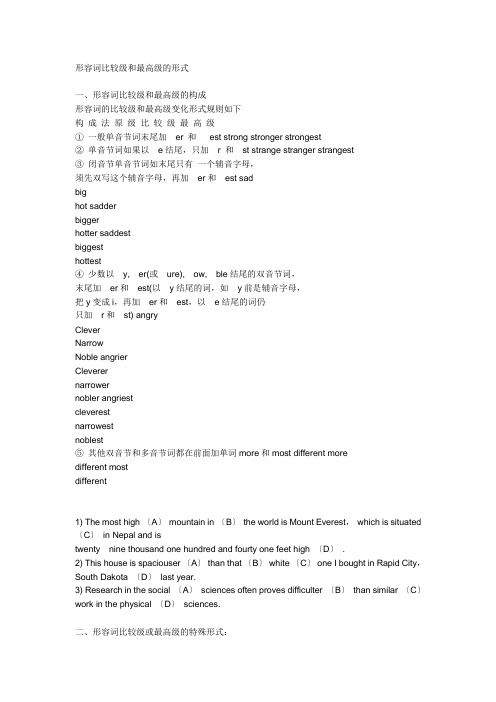
形容词比较级和最高级的形式一、形容词比较级和最高级的构成形容词的比较级和最高级变化形式规则如下构成法原级比较级最高级①一般单音节词末尾加er 和est strong stronger strongest②单音节词如果以e结尾,只加r 和st strange stranger strangest③闭音节单音节词如末尾只有一个辅音字母,须先双写这个辅音字母,再加er和est sadbighot sadderbiggerhotter saddestbiggesthottest④少数以y,er(或ure),ow,ble结尾的双音节词,末尾加er和est(以y结尾的词,如y前是辅音字母,把y变成i,再加er和est,以e结尾的词仍只加r和st) angryCleverNarrowNoble angrierCleverernarrowernobler angriestcleverestnarrowestnoblest⑤其他双音节和多音节词都在前面加单词more和most different moredifferent mostdifferent1) The most high 〔A〕mountain in 〔B〕the world is Mount Everest,which is situated 〔C〕in Nepal and istwenty nine thousand one hundred and fourty one feet high 〔D〕 .2) This house is spaciouser 〔A〕than that 〔B〕white 〔C〕one I bought in Rapid City,South Dakota 〔D〕last year.3) Research in the social 〔A〕sciences often proves difficulter 〔B〕than similar 〔C〕work in the physical 〔D〕sciences.二、形容词比较级或最高级的特殊形式:1. 三个或三个以上音节的形容词只能加more和most只能说more beautiful而不能说beautifuller; 只能说the most beautiful而不能说beautifullest。
形容词和副词的比较级和最高级(完美版)

形容词、副词的比较级和最高级一.形容词和副词的比较级和最高级的变化方法如下(1) 符合规则的:( 1)和冠词连用the +形容词原级+v(复),指一类人或物the +形容词比较级,指两者中“较…的”的那一个,eg. the younger of thea/ an +形容词比较级eg. The pen is expensive. I want a cheaper one.( a) +most+形容词最高级“非常…”eg. a most beautiful city( 2 ) 相关结构a. 原级比较:肯定句as….as…., 否定句not so / as….as…..b.比较句:比较级+than….或more (less) ….than…..The furniture in this shop is less beautiful than that in that shop.c.比较级+and+比较级或more and more+比较级“越来越… ”richer and richer, more and more interestingd. The more….., the more…..“越…,越…”The more you look at the picture, the better you will like it.e. 比较级+than any other +n. (单)(适用于范围一致时)(all) other +n.(复)any +n.(单) (适用于范围不一致时)He is taller than any other student / all other students in his class.any student in my class.f. 倍数表达法。
A is three(four, etc.)times the size(height, length etc.)of B.A is three(four, etc.)times as big(high, long, etc.)as B.A is three (four, etc.)times bigger(higher, longer, etc.)than B.用times 表倍数通常用于三倍以上,两倍可以用twice或double.The new building is four times the size (the height)of the old one.Asia is four times as large as Europe.Your school is three times bigger than ours.g. 最高级+of/ in/ among….He is the tallest of the three/ among them/ in is class.形容词、副词的比较级和最高级专项练习(一)写出下列形容词与副词的比较级与最高级形式:long __ wide __ ___ fat _ ___ heavy _____ ____ slow _____ ____ few _____ ____ brightly ___ _____ important ___ _____ far ____ ______ quickly ____ ____ happy ___ ____ many _______interesting __ __good ___ ___(二)用所给词的正确形式填空:1. He ran ______ than all the others. He ran _______ of all. ( fast )2. James played as ______ as you. Mary played _______of all. ( well )3. She waited ________ than she usually did. ( long )4. I walked _______ than the rest. I walked _______ of all. ( far )5. My friend came ________ than Pual and Mike. ( late )6. Among the three boys he works ________. ( hard )7. Bob left school ______ in his class yesterday. ( late )8. He swims as ______ as I do. ( badly )9. Who did _______ in the 100-metre race, Jim or Tim? ( badly )10. Both Li Ming and Li Hong sang __________, but I sang _______ of all. ( badly )11. Peter is as _______ as Tom. Benny is _____ than Tom. David is ______ of all. ( fat )12. Li Li found _________ mushrooms than I did. ( many )13. The elephant is ________ than any other animals. ( big )14. Man is ________ than animals. ( much clever )15. Lesson Two is a bit ________ than Lesson One. ( easy )16. I’m _______ boy under the sun. ( happy )17. Today is ________ than yesterday. ( hot )18. An elephant is _______ than a tiger. It is _______ animal on land. ( big )19. Mr. Li is _______ than your uncle. ( thin )20. Which book is _________, yours or mine? ( thick )21. This park is much _______ than that one. ( beautiful )22. The first book is more useful than the second one.The second book is ______ than the first one. ( useful )23. Allan is _______ of the three boys. ( strong )24. His marks are _______ than his friend’s ( bad )25. It is _______ to do this maths problem than to do that one. ( easy )26. My house is ________ to the farm than yours. ( far )27. My work is more important than yours. Your work is ________ than mine. ( important )28. Climbing this hill is _________. Climbing that hill is ________. Climbing Mt. Everest is _______ ofall. ( dangerous )29. Mt. Everest is _________ than the Mont-Blanc. ( high )30. My mother drives very carefully. She is a _________ driver than my father. ( careful ).31. Of the two girls, I find Lucy the _______ (clever).32. Gold(黄金) is ______ (little) useful than iron(铁).33. My sister is two years _______ (old ) than I.34. John’s parents have four da ughters, and she is the _____ (young) child.35. The _____ (cheap) bags are the not usually the best ones.36. The short one is by far _______ expensive of the five.37. The boy is not so ______ (interesting) as his brother.38. Dick sings _____ (well), she sings ______(well) than John, but Mary sings______(well) in her class.39. She will be much ______ (happy) in her mew house.40. This dress is ______ that.(twice, as…as…, expensive)(三)选择填空:1. He feels _____ today than yesterday. A. tired B. more tired C. more tireder D. much tired2. Which do you like _____, coffee, tea or milk? A. the worst B. worse C. the worse D. worst3. Of the two toys, the child chose_____.A. the expensive oneB. one most expensiveC. a least expensiveD. the most expensive of them4. The line is ____ than that one. A. more longer B. not longer C. much more longer D. many more longer5. The earth is _____ the moon.A. as 49 times big asB. 49 times as bigger asC. 49 times as big asD.as big as 49 times6. The book is ____ of the two. A. thinner B. the thinner C. more thinner D. the thinnest7. She looks _____ than she does. A. the more older B. very older C. much older D. more older8. The garden is becoming ______.A. more beautiful and moreB. more beautiful and beautifulC. more and more beautifulD. more beautiful and beautifuler9. They competed(比赛)to see who could work _____.A. the fastest and bestB. the faster and the betterC. fastest and betterD. faster and better10.______ hurry, _______speed. A. More, less B. Much, little C. The more, the less D. The much, the little11. This kind of coffee is different ______.A. and it is also betterB. and better than the otherC. but also than othersD. from the other, and better(四)翻译句子:1.本书跟那本书一样有趣。
- 1、下载文档前请自行甄别文档内容的完整性,平台不提供额外的编辑、内容补充、找答案等附加服务。
- 2、"仅部分预览"的文档,不可在线预览部分如存在完整性等问题,可反馈申请退款(可完整预览的文档不适用该条件!)。
- 3、如文档侵犯您的权益,请联系客服反馈,我们会尽快为您处理(人工客服工作时间:9:00-18:30)。
1. 规则变化
单音节词和少数双音节词,加词尾-er, -est来构成较级和最高级。
其他双音节词和多音节词,在前面加more, most来构成比较级和最高级。
2. 不规则变化
形容词比较级最高级练习题
一、写出下列形容词的比较级和最高级
1. old ______ ________
2. busy _________ _________
3. thin ________ ________
4. many _________ _________
5. slow ________ _____
6. delicious _________ ______
二、用适当形式填空:
1. Bob is ________( young ) than Fred but__________(tall) than Fred.
2. He is ______ (bad) at learning maths. He is much _______ (bad) at Chinese and he
is the _________ (bad) at English.
3. Annie says Sally is the ________ (kind) person in the world.
4 A dictionary is much _________ (expensive) than a story-book.
5. An orange ia a little ______ (big) than an apple, but much ________ (small) than a
watermelon.
6. Playing computer games is______ _____ _____ of all the activities.(interesting).
7. The Nile(尼羅河) is ______ ________river in the world. (long)
8. Good health is _______ _______ ________thing life. (important)
9. Taking a taxi is ______ _______ way to get to the airport. (easy)
10. She is_______ than all the other students. (young)
11. Where is the ________bus-stop? (near)
12. Tom drives much ________ ________than John. (careful)
13. The white flower is ________(beautiful). The yellow flower is ______ _______
(beautiful)than the white flower. The red flower is the _____ ______ of the three.
三、选择题
1. She is ________ than ________ .
A. busier / us
B. busier / we
C. more busy / us
D. more busy / we
2. China is ________ country in the world.
A. the third largest
B. the largest third
C. the third large
D. a third largest
3. -Which is ____ season in Beijing?-I think it's autumn.
A.good
B.better
C.best
D.the best
4.- Which is__________ , the sun, the moon or the earth?-- Of course, the moon is.
A.small
B.smaller
C.smallest
D.the smallest
5.The air in Beijing is getting much _____ now than a few years ago.
A. clean
B. cleaner
C. cleanest
D. the cleanest
6. Mobile phones are very popular now and they are _____ than before.
A. cheap
B. cheaper
C. cheapest
D. the cheapest
7 Which is _____ , a bicycle or a computer?
A. expensive
B.more expensive
C.the most expensive
8. The Yellow River is one of ______rivers in China A long B longer C the longest
9.She is the second _______student in our class. A. tall B. taller C. tallest。
